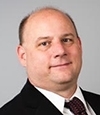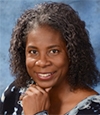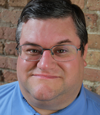Join Your Peers for Three Days of Focused Discussion
Senior sysadmins will want to participate in one or more of these workshops. Attendance is limited for each workshop, which ensures a seminar-like atmosphere.
Each half-day workshop costs $95. Please make sure you do not select another session whose timing conflicts with that of your workshop.
Questions? Contact conference@usenix.org.
SUNDAY:
WS1: Hybrid Cloud Reference Architectures | WS2: Data Center Virtual Realities: What Could They Look Like?
MONDAY:
WS3: Government Interaction Roundtable | WS4: Going beyond The "Shrink Wrap": Inclusion, Diversity, and IT | WS5: Government and Military System Administration Workshop | WS6: Sourcing, Interviewing, and Hiring Systems Engineers
TUESDAY:
WS7: HPC Compute Cluster Workshop | WS8: Managing System Managers | WS9: Plays Well with Others: Applied Improv for Technologists
Sunday, December 4, 2016
9:00 am–12:30 pm
Workshop 1
Hybrid Cloud Reference Architectures
Edward L. Haletky, The Virtualization Practice, LLC.
This workshop will propose a starting point for a secure hybrid cloud infrastructure architecture. The workshop will focus on expansion of this architecture with governance (security, data protection), integration of third party tools and tech concepts, open source considerations, design aspects, and operations. Participants will learn from the exercises and also help co-author an update to the starting reference architecture.
Edward L. Haletky, The Virtualization Practice, LLC.

Edward L. Haletky, a.k.a. Texiwill, is the author of VMware vSphere(TM) and Virtual Infrastructure Security: Securing the Virtual Environment as well as VMware ESX and ESXi in the Enterprise: Planning Deployment of Virtualization Servers, 2nd Edition. Edward owns AstroArch Consulting, Inc., providing virtualization, security, network consulting and development, and The Virtualization Practice, where he is also an analyst. Edward is the moderator and host of the "Virtualization Security" podcast as well as a guru and moderator for the VMware Communities forums, providing answers to security and configuration questions. Edward is working on new books on virtualization.
1:30 pm–5:00 pm
Workshop 2
Data Center Virtual Realities: What Could They Look Like?
Tony Foster, Dell EMC
In this half-day workshop, we will work toward developing how Virtual Reality (VR) can be leveraged in the Data Center to change how both users and data centers operate. As a team we will see what VR technologies (like Graphics Processing Units (GPUs), Oculus Rift, Google Cardboard, and others) we could use to create new realities in data centers. Some of the new realities we might want to consider as part of VR in the data center include visualizing cloud structures and virtualized environments, real time system diagnostics, and self-learning/healing data centers. All of which could impact how the group investigates applying VR in the data center. The group may want to probe further into each of these areas.
Cloud Structures and Virtualized Environments:
As the idea of the cloud permeates our society, the question can be asked: "how do we comprehend cloud structures?" After all, resources are shared and maybe spread between multiple locations. What does this mean to the group as we delve into VR in the data center? We may want to consider how virtual reality can help provide a single view of these cloud structures. What would they look like in a new cloud reality? What other facets of cloud visualization do we need to consider as a group so we can lay the foundation for VR in a cloud based data center?
Real Time System Diagnostics:
Of course, these cloud worlds are all built on physical systems in a data center somewhere. How does the group take this into account? These data centers are filled with rows and rows of identical hardware with glowing lights blinking on and off to the hum of a song we cannot hear. What could this group devise to change someone’s experience in the data center? Are there existing technologies or standards we could use to augment how the data center is viewed, such as Oculus Rift or Google Glass? What could this group devise to make data centers run more efficiently by leveraging virtual reality?
Self-Learning/Healing Data Centers:
Being able to visualize areas of concern in the data center could be powerful. What if the datacenter was able to learn and heal its self? Could this group discover a way to leverage deep learning, GPUs, and the throngs of data generated by components in the data center to make it more intelligent? What attributes would be needed so the data center could understand and react to changes, possibly maintaining or improving the data center's health autonomously?
It would be interesting for this group to investigate other possible ways this learning and healing could be applied to virtual reality in the data center. What things would be helpful to have the data center respond to on its own? How could the group facilitate the creation of a reusable construct, enabling new self-learning models for the data center? What new cloud structures would start to grow from an analytical data center and what would they look like? Each of these highlighted areas are interconnected. What the team will need to explore is how to unify them to create a new virtual reality in the data center. As we find answers in one area, it can unlock new horizons in another area. Come and explore the virtual reality of data centers and see what develops.
Tony Foster, Dell EMC

Tony, a.k.a. the WonderNerd, has been involved in the virtualization industry since 2005, where he has architected, deployed, and supported virtualization systems for organizations large and small in both the public and private sector. In recent years he has branched out into GPU architectures and exploring ways to leverage them in the data center. Tony has been at the forefront of designing GPU solutions at EMC for the last four years. This includes significant contributions to the VCE Technology Extension for Compute offered by the company. Tony is also active in the social communities as a VMware vExpert, VMware EUC Champion, and is an NVIDIA GRID Community Advisor. You can often find him presenting at conferences around both virtualization and GPUs. If you are interested in finding out more about Tony be sure to visit https://wondernerd.net.
Monday, December 5, 2016
9:00 am–12:30 pm
Workshop 3
Government Interaction Roundtable
Branson Matheson, Cisco Systems, Inc.
This workshop is a result of many requests for more discussion on the topic of interaction between the many governments, their agencies and institutions; with Information Technology professionals. Our objective would be to get several professionals from government agencies (both US and otherwise if possible ) to join workshop participants to present their perspective and ideas on how to resolve some of the problems that occur during these events. The workshop will be in a roundtable format where we will solicit discussion points from all the attendees and then delve into them with the parties involved. With all the publicity that has occurred, both positive and negative, around recent interactions, the hope is that this workshop will develop useful and relevant guidance for admins to be able to handle these interactions properly.
Branson Matheson, Cisco Systems, Inc.

Branson is a 29-year veteran of system architecture, administration, and security. He started as a cryptologist for the US Navy and has since worked on NASA shuttle and aerospace projects, TSA security and monitoring systems, secure mobile communications, and Internet search engines. He has also run his own company while continuing to support many open source projects. Branson speaks to and trains sysadmins and security personnel world wide; and he is currently a senior technical lead for Cisco Cloud Services. Branson has several credentials; and generally likes to spend time responding to the statement "I bet you can't...."
Workshop 4
Going beyond the "Shrink Wrap:" Inclusion, Diversity, and IT
J. Goosby Smith, Ph.D., The Citadel
We will start with an interactive introduction exercise that will result in participants knowing each others' names. Next, we will engage in an experiential examination of the diversity present in the room. I will present a robust definition of diversity that goes beyond the "shrink wrap" (e.g., personality, gender (as well as sex), parental status, etc.). After debriefing this exercise and its relevance to it, participants will create a collective model for how "diversity" impacts the role of the IT professional. Next, we will shift from diversity to inclusion—an entirely different yet often closely correlated construct. In trios, participants will share their peak moments of inclusion in IT. They will collectively build a model of an inclusive IT culture. I will then present my research-based model of inclusion and we will brainstorm best practices of inclusion in IT. I will close the workshop with an exercise that elicits what each person has contributed to the learning and growth of others.
J. Goosby Smith, Ph.D., The Citadel

An experienced author, consultant, and public speaker on topics of diversity and inclusion in corporate, higher educational, and military work contexts, Smith's goal with each organizational encounter is to increase human thriving, creativity, and resilience in organizations. She is presently an Associate Professor of Management and Leadership in Charleston at The Citadel, The Military College of South Carolina, where she also serves as Director of Graduate Programs in Leadership. Prior to earning her Ph.D. in Organizational Behavior from Case Western Reserve University, she earned her M.B.A. (also at Case) and her B.S. in Computer Science from Spelman College.
1:30 pm–5:00 pm
Workshop 5
Government and Military System Administration Workshop
Andy Seely, SAIC
The Government and Military System Administration Workshop is for system administrators and technical staff responsible for operating and maintaining computing systems owned by government or military agencies. If you struggle with competing government regulations, work in secure environments, deal with classified data, provide GOTS support, or deploy to remote locations in support of government and military requirements, then this workshop is for you. The audience for this workshop includes contractors, government civilian employees, vendors and suppliers, uniformed military members, and anyone who has a direct hands-on IT support role in the federal, state, and local government and military sectors. The workshop will be a combination of formal presentations and guided discussions on topics like implementation of cloud technologies, data analytics in the government sector, and responding to policy and regulation requirements for IT and information security. This workshop is a great opportunity for sysadmins to compare notes across diverse agencies like DoD, DoE, DoC, NASA, and local governments, and you will take back to work new perspectives on old problems, advanced knowledge on new government mandates, and great contacts in other agencies where your problems may have already been solved. All workshop discussions will be strictly unclassified.
Andy Seely, SAIC
Andrew “Andy” Seely is a Solution Architect for Science Applications International Corporation (SAIC) in Tampa, Florida. He got his start in IT as a night shift tier-one and spent the last 20 years in the government and military sector, growing as a sysadmin, engineer, supervisor, and eventually a technical manager for small and large teams. Along the way, he learned that the hardest skill of a good manager is knowing when to be the boss and knowing when to be quiet and listen. Andy shared many of his management experiences in his bimonthly column "/var/log/manager" for USENIX ;login: magazine in 2014 and 2015, and he has chaired the Government and Military System Administration Workshop at LISA almost every year since 2008.
Workshop 6
Sourcing, Interviewing, and Hiring Systems Engineers
Connie-Lynne Villani, Grilled Cheese Invitational
1:30 pm–5:00 pm
Managing a team of engineers inevitably means hiring engineers, a task that even experienced managers can find daunting. This workshop aims to bring together managers from industry and academia to share our techniques for finding talented staff that fit our needs. Topics to be discussed include:
- Talking to recruiters—as the customer, not the product!
- Writing job descriptions
- Non-traditional ways of finding candidates
- Prepping your team for interviews
- Interviewing before you have a team
- Interviewing for skills you don't have
- Making a decision and an offer
Participants are encouraged to bring with them job descriptions that need revision as well as examples of descriptions and recruiting techniques that worked for their teams.
Connie-Lynne Villani, Grilled Cheese Invitational

With degrees in both Electrical Engineering and Theater Management, Connie-Lynne brings 20 years of System Engineering experience to the table, as well as a keen understanding of how to handle drama in the workplace. In addition to founding and managing Groupon's first SRE team, Connie-Lynne has worked at Linden Lab, Change.org, and Caltech, but admits that her most fun position is serving as a board member for the Grilled Cheese Invitational, an annual food festival celebrating all things cheesy.
Tuesday, December 6, 2016
9:00 am–12:30 pm
Workshop 7
HPC Compute Cluster Workshop
Clay England, Oak Ridge National Laboratory
The HPC Compute Cluster Workshop will provide a forum for HPC compute cluster admins and those interested in this topic to meet and discuss the challenges of administering this particular class of machine. Though this workshop will also be applicable to general *NIX admins, there are many specific topics related to cluster management, customer usage, and special software (such as schedulers and resource managers) to warrant a half-day workshop for the benefit of this niche community. Topics that will be discussed include cluster setup, day-to-day management strategies, common problems and possible solutions, user issues, and any other topics of interest to the attendees.
Clay England, Oak Ridge National Laboratory

Clay England earned his M.S. in Computer Science from the University of Tennessee in 2003. He currently is the Team Lead of the Linux clusters team in the National Center for Computational Sciences at Oak Ridge National Laboratory and responsible for all the production compute clusters that support the petascale supercomputers at ORNL. Prior to joining ORNL, he was a systems administrator for the Computer Science department at the University of Tennessee. He has seventeen years of experience building and administering production computing resources in both research and academic environments.
Workshop 8
Managing System Managers
Cory Lueninghoener, Los Alamos National Laboratory
This workshop is intended to bring together people who currently manage or aspire to one day manage system managers to talk about the challenges they face, share best practices in their jobs, and build their networks. Topics that could be discussed include:
- Hiring
- Recruitment
- Interviewing
- Compensation
- Why do management?
- Incentives
- What makes system management people happy?
- Time management
- "Resource" management
- Managing up
- Managing down
- Leadership vs. management
- Needed skills
- Performance appraisals/management
- Estimating staffing levels, required level of effort, etc.
Cory Lueninghoener, Los Alamos National Laboratory

Cory Lueninghoener is a system administrator and manager at Los Alamos National Laboratory. Along with designing, building, and managing some of the largest scientific computing resources in the world, he has spent the last four years building, leading, and managing teams who do the same. Cory led the LISA Configuration Management Workshop for several years and was co-chair of LISA15.
1:30 pm–5:00 pm
Workshop 9
"Plays Well with Others"—Applied Improv for Technologists
Brian Sebby, Argonne National Laboratory
Getting everyone in your company or development team on the same page can be a challenge. This on-your-feet workshop will teach fast and fun improv techniques for helping your group to bond, generate quality ideas, and make quick decisions. Learn the secrets of applied improv for business from a longtime sysadmin who has decades of experience working in open source, Internet startups, and corporate training.
Improv isn't just for performing on "Whose Line Is It Anyway?"—it's a great tool for reacting to new situations without being thrown, recognizing personal dynamics, putting aside ego instead of rehashing the same Chef vs. Ansible vs. Puppet arguments again, and coming up with great ideas while minimizing ego and baggage.
This is not a lecture, but an on-your-feet workshop. Participants will move, laugh, and get to know each other while learning the basics of applied improvisation. The “yes and” philosophy of improv is valuable for managers, team members, or anyone needing to simply get their group on the same page. No need to take notes—all participants will receive a link to the entire curriculum, as well as additional exercises and information they can take back to their own companies.
Brian Sebby, Argonne National Laboratory

Brian Sebby is a Senior Systems Administrator at Argonne National Laboratory with 16 years of experience managing the laboratory's core Unix infrastructure and business systems. He bought a Groupon for a class at ComedySportz in 2011 and quickly fell in love with improv. He has since studied and performed around Chicagoland at ComedySportz, the Annoyance, One Group Mind, iO, and Westside Improv. Brian presented the poster "DevOps is Improv" at LISA '15, and has assisted with running the Improv Workshop at LISA for the past two years.


